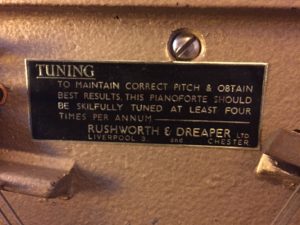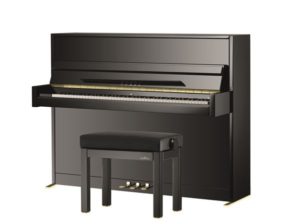One can obtain astonishing bargains on websites such as ebay, but there are also unwanted pianos whose owners are unaware of their true value, offering what seems like a low price for something essentially worthless. When you are purchasing a second-hand piano online, there are four things you should keep in mind:
1. The newer the piano the better. Pianos do not age well. The average lifespan of a piano is about 50 years: over time the wood deteriorates, the soundboard warps and cracks, action parts break which cost more to replace than the price of a better piano. If you buy a piano that’s older than 80 years there’s a strong chance that it won’t be able to be tuned and will certainly never sound as good as new. If you can, buy a piano that’s less than 20 years old (older pianos in good condition may be worth it, however).
2. Buy an iron-framed piano and avoid wooden-framed pianos at all cost. Iron frames are preferable because they can better withold the massive amount of tension caused by the piano strings. Wooden-framed pianos go out tune very quickly for this reason as the wood warps due to changing humidity. Thankfully, wooden-framed pianos are not as commonly found as iron-framed ones.
3. The phrase “good things come in small packages” is not true in the case of pianos. Larger pianos are generally better because the longer strings provide a richer tone. However, with the advent of overstrung pianos (where the strings are strung diagonally rather than vertically), smaller overstrung pianos can also have excellent tone. Straight strung pianos will be lower in value and their tone is not usually as good (they’re generally pianos made for beginners), therefore they are usually not worth buying second-hand.
4. Perhaps the most important thing to bear in mind is the condition of the piano. In this case it would be wise to have a specialist view the piano (I charge £20 for visits to inspect pianos) and assess the condition before buying anything. If you buy anything that needs a lot of resoration work, you might not be getting such a good deal as you thought, as extensive resoration work can sometimes cost more than the price of the piano.
I have customers with old pianos that are in OK working order and they are satisfied with the sound and quality of them, but these tend to be either relative begineers who will eventually upgrade to something better, or they are people with young children who are only starting to learn how to play.
If you have an ancient piano and your heart is set on keeping it, then most of the time it can be made to sound OK (but never as good as new). Last week I was called for a job in Rotherham to find a 100 year old piano with a beautiful rosewood finish that luckily only required some minor regulating work replacing the centre pins. The tone was rather dull-sounding compared to a new piano, but it was relatively close to concert pitch and had been kept well-maintained by its previous owner. On the other hand, about six months ago I was called out for a job in Woodseats, Sheffield, and found an untunable straight-strung overdamper made in the 1900s. The customer purchased it for a low price on gumtree unfortunately unaware of the poor condition the piano was in and I had no choice but to refuse to tune it, knowing that no matter how good a piano tuning I did, it would sound little better.
Take your time when looking for a new piano and don’t rush into things. What seems like a bargain might in fact be someone trying to get you to pay the movers to get rid of their valueless piano (or they might simply be unaware of that their piano is beyond repair). If you buy a high-quality piano in good condition, you will save money in the long run by avoiding costly restoration work, and hopefully you will have a beautiful-sounding piano that you can own and cherish for a very long time.
– Richard, Piano Tuner Sheffield.

